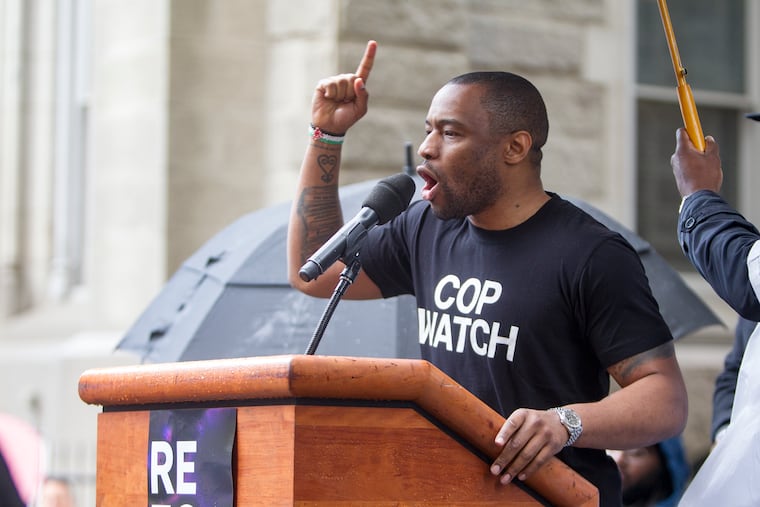From Jerusalem, Marc Lamont Hill’s ‘river to the sea’ comments hit too close to home | Opinion
While the Israeli-Palestinian conflict naturally engenders strong feelings on both sides of the political divide, there should be no debate -- even among the most passionate pro-Palestinian activists -- about the moral necessity to condemn hate, extremism and violence directed towards innocence.

JERUSALEM -- As a U.S.-born citizen of Israel, I’m often dismayed by the double standards employed by many well-meaning Americans when condemning anti-Semitism.
It is problematic that anti-Semitism from the far right immediately elicits outrage toward the culprit and sympathy toward the victims, while similar acts by those on the far left are often downplayed, excused, or even justified.
A case in point is the rush by many to defend Marc Lamont Hill, a political commentator and Temple University professor who was fired by CNN after a speech he gave at the United Nations on the annual International Day of Solidarity with the Palestinian People.
<< READ MORE: Marc Lamont Hill: I’m sorry my word choices caused harm | Opinion
Unfortunately, if you were to base your understanding of why CNN fired Hill on the international media coverage of the row, and tweets by Hill’s defenders, you’d come away with the false impression that he was let go merely for criticising Israel and calling for a “free Palestine.”
In fact, he was fired because his speech included a call for a future Palestinian state “from the river to the sea,” and a thinly veiled justification for Palestinian terror.
Regarding the "river to the sea" comments, Hill denied that it was a call for Israel's destruction.
However, there is simply no question that, among Western pro-Palestinian activists and -- especially -- terror groups like Hamas, calling for a future Palestine “from the [Jordan] river to the [Mediterranean] sea” is code for the rejection of the continued existence of a Jewish state within any borders. In fact, Hill himself, in a recent tweet, acknowledged that he holds this view.
<< READ MORE: Temple should take action after Marc Lamont Hill’s Israel comments | Opinion
Hill’s support for the Palestinian right to engage in terrorism seems clear in several passages from his speech, including his evocation of the American slave revolts, which he described as equally important to attaining freedom as non-violent methods, adding that “true solidarity” with the Palestinians “must allow them the same range of opportunity.” He also spoke of the alleged “right of an occupied people to defend themselves,” and rejected what he termed the “narrow politics that shames Palestinians” for engaging in this kind of “resistance.”
Moreover, it’s important to note that Hill’s apparent support for violence isn’t a one-off. He has previously advocated on behalf of convicted Palestinian terrorist Rasmea Odeh, appeared to justify the kidnapping and murder in 2014 of three Israeli teens by Palestinian terrorists, and, in 2017, labeled the call for Palestinians to reject hatred and terrorism “offensive and counterproductive.”
Hill has denied that he supports anti-Semitism. Yet, according to the International Holocaust Remembrance Association’s working definition of anti-Semitism -- adopted by 32 countries, including the U.S. -- both supporting those who kill Jews in the name of a radical ideology, and denying Israel’s right to exist as a Jewish state, are defined as anti-Semitic.
Further, Hill has defended and expressed support for Louis Farrakhan, who’s among the more extreme public purveyors of anti-Semitic (and anti-LGBT) rhetoric in America.
Let’s be clear: when activists defend the Palestinian “right of resistance,” and call for a free Palestine from the river to the sea, they’re giving a moral pass to violent extremists on my country’s borders, telling the likes of Hamas and Islamic Jihad that all Israelis are fair game, both soldiers and civilians -- my two young daughters who live within the pre-1967 boundaries, as well as close friends who reside in communities across the green line.
While the Israeli-Palestinian conflict naturally engenders strong feelings on both sides of the political divide, there should be no debate -- even among the most passionate pro-Palestinian activists -- about the moral necessity to condemn hate, extremism, and racist violence directed toward innocent Jews, whether the perpetrator is a white supremacist or a Palestinian terrorist, and regardless of whether the victim resides in Paris, Pittsburgh, Hebron, or Tel Aviv.
Adam Levick is a senior researcher at the Israel office of the Committee for Accuracy in Middle East Reporting in America (CAMERA).